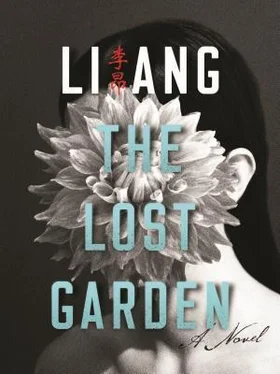“Like I was born in the last year of the First Sino-Japanese War.”

A blanket of lotus flowers bloomed before her eyes, seemingly covering the sky.
In early summer the lotus leaves that had just sprouted were a pleasant green, each long, round leaf rippling like a green wave when a breeze blew past. After an occasional shower in the summer afternoon, the drops of rain remaining on the leaves rolled around and sparkled. The lotus grew abundant new leaves that were layered upon one another until they clamored over the bench into the center of Flowing Pillow Pavilion. Sometimes a red lotus stem would squeeze through the leaves and open its pink petals to reveal the tender yellow stamen.
Father was sitting on a rosewood lounge chair with mother-of-pearl inlay. His hair was showing some gray; the fineness of the hair gave it a light quality, so the pale gray hair, with its natural curl, fell gently around his face. Crow’s-feet adorned his slightly sunken eyes, which looked large and pretty with their double folds, but there was a quiet liveliness in the expression.
Yinghong knocked on the open wooden door. Now in high school, she was tall enough to reach the top of the frame, and no longer had to experience the panicky fear whenever the tightly shut door wouldn’t budge, even if she pushed hard. Over the years, Father had gradually dropped the habit of locking every door and window wherever he happened to be, and he no longer spent hours in bed.
“Ayako.” Looking up from the book he was reading, Father called her Japanese name in an even more tender tone. He spoke to her in Japanese, as usual. “You came at the right time, Ayako. I’m going through some books that have been in our family for a long time. You know I haven’t read these Chinese books for many years.”
“Hai.” With her hands on her knees, she leaned forward slightly to respond in Japanese, before squatting beside her father’s rosewood lounge chair.
“I happened to open to the page in the History of Jin where Wang Ji wrote about ‘using the flowing water as a pillow and rinsing his mouth with rocks.’ Who among the intellectuals, particularly those in present-day Taiwan, has the strength of character befitting the spirit of ‘using the flowing water as a pillow in order to wash the ears and rinsing the mouth with rocks in order to sharpen the teeth’?”
Father read the lines in Mandarin, but switched back to Japanese as he continued:
“Think about it. How many of the intellectuals these days could really pillow their heads on water to wash their ears and willingly listen to the truth and face reality? Or to rinse their teeth with rocks and willingly speak the truth to demand changes and progress?”
With her head down, she listened carefully while Father continued in a gloomy voice:
“Those Taiwanese were killed off a long time ago. The ones remaining are just like me, utterly useless, the dregs of society.”
The yellowed paper of the book was double-fold, and the thin pages were showing their age. Some were breaking at the folds, but the cotton fiber managed to keep them together, as if bound by some emotional connection. One of the cracked pages displayed half a line of text that was still recognizable: “Biography 26, Volume 56 of the History of the Jin, Sun Chu.”
“Do you still remember, Ayako, when you were little you once wrote that you were born in the last year of the Sino-Japanese War?” Father changed the subject, but remained pensive. Obviously he had been thinking about this. “It’s now finally become clear to me that the Sino-Japanese War had a profound effect on the Taiwanese.”
Her upbringing dictated that she keep her head bowed to listen, but she was nevertheless apprehensive, particularly because Father had never touched upon topics like this. He was quiet for a while before continuing in his deep, gloomy voice:
“I’ve been thinking lately that I myself am one of those Taiwanese born in the last years of the Sino-Japanese War, those who were oppressed and suffering but unable to speak up.” Misgivings about what he was saying made him stop in mid sentence, but he managed to continue: “I still hold out hope. The Taiwanese may still have some backbone, even if just a little …”
His voice seemed to be breaking up, prompting her to look up in fear. She saw instead that the dark-green lotus leaves dotted with red flowers were swaying in the wind, rolling and roiling like undulating ocean waves.
“What’s your name, little girl?”
In the main, the men who asked this question were middle-aged. They dressed in tunics of the Sun Yat-sen style, the blue fabric turning white from too many washings, the cuffs worn to the point of being threadbare. The pant legs were wide, loose, and shapeless, with no sign of a crease down the middle. They spoke the Beijing dialect, but with accents from other provinces, which made it hard for Zhu Yinghong to understand everything they said.
At first she answered politely:
“My name is Zhu Yinghong.”
“Zhu Yinghong?” The questioner repeated her answer with a friendly smile. “That’s a good girl. You’re very smart. Would you mind telling me your father’s name?”
“Zhu Zuyan.”
“And your mother?”
“Ye Yuzhen.”
She stood with her feet together, her back straight. Her teacher had taught her to be respectful to her elders, to answer their questions clearly, and to always wear a smile.
“Does your father often take you places?”
“Father isn’t well. He stays in bed.” She answered in a soft voice; her smile was fading, but she struggled to hold on to it.
“Does he have any frequent visitors?”
“No.”
“Are you sure?”
“Yes, I’m sure. No one comes to visit us, not even the uncles from the Upper House. Ah-shu and Ah-xiong don’t come to play with me either.”
The questioner listened attentively and paused before continuing.
“What does your father usually talk to you about?”
“Nothing.” Tears began to well in her eyes. “Mother said Father mustn’t tire himself out.”
The man cut her off to ask urgently:
“Has he ever talked to you about who’s a bad person, or said down with someone, or that someone should be taken out and shot?”
“No.”
“Really?”
“No. Father never says anything bad about anyone,” she answered forcefully before adding, “What does ‘down with someone’ mean?”
The man turned and left without answering her question.
On her way home, she wondered why the questioner hadn’t even said “good-bye.” At night, when Mudan was washing Yinghong’s feet in a little red lacquered pail, she stretched out her pudgy legs to kick up some water and sprayed Mudan, who grumbled unhappily. Yinghong had planned to tell her about the man who’d asked about her father, as she was reminded of how, since her father had returned after his sudden disappearance, everyone else in the family was whispering about what had happened to him but immediately shut up if she was around. The look on Mudan’s face made her decide not to say anything now.

When the incident occurred, Zhu Yinghong was startled out of a deep sleep by a commotion somewhere in the house. The moment she opened her eyes she had a feeling that neither of her parents was in bed. As usual, she reached out to touch the thin blanket covering the plank bed, and felt nothing but a cold chill. Years later, she would piece together what little she remembered of that night with what she’d heard here and there, and concluded that it had happened sometime in April or May.
Читать дальше













